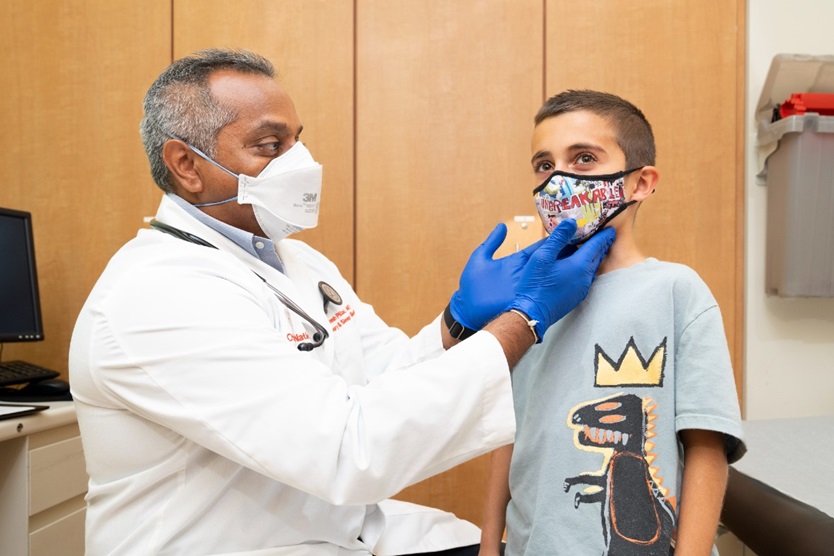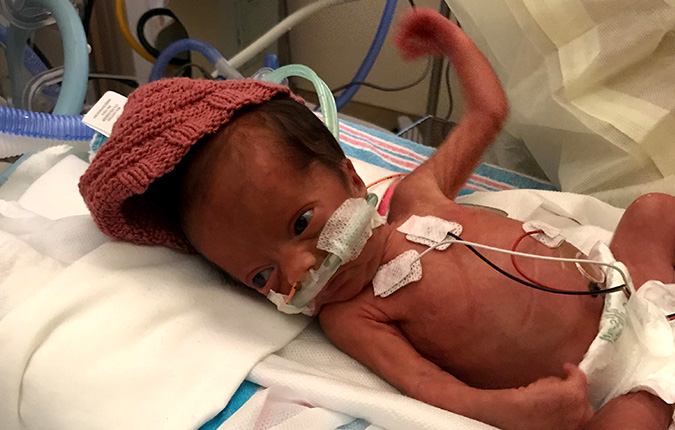Condition
Pediatric Constipation
Key points about constipation in children
- Constipation is the most common GI (gastrointestinal) problem.
- You may be constipated when your stools are painful and happen less than three times a week.
- Your stool will be hard, dry and in small pieces.
- Your stools get hard and dry when your colon absorbs too much water.
- Constipation symptoms can include stomach cramps and feeling tired.
- Constipation can cause other health problems such as hemorrhoids (red, swollen veins in the rectum).
- Making diet and lifestyle changes can reduce constipation symptoms. These changes can also stop constipation from happening.
Frequently Asked Questions
Prevention and Risk Assessment
What is constipation?
Constipation is when your stools are painful or they do not happen often enough. It is the most common GI (gastrointestinal) problem.
You may have constipation if:
- You have bowel movements less than three times a week
- Your stool is hard, dry and in small pieces
Normal bowel movements vary depending on the person. They may happen as often as three times a day. Or they may happen just three times a week.
What causes constipation in children?
Your stool gets hard and dry when your colon (large intestine) absorbs too much water.
In most cases, as food moves through your colon, the colon absorbs water while it makes stool. Muscle movements (contractions) push the stool toward your rectum. When the stool gets to the rectum, most of the water has been soaked up. The stool is now solid.
If you have constipation, your colon's muscle movements are too slow. This makes the stool move through your colon too slowly. The colon absorbs too much water. The stool gets very hard and dry.
Some of the most common diet and lifestyle causes of constipation are:
- Not getting enough exercise
- Not drinking enough liquids
- Not eating enough fiber
- Not moving your bowels when you feel the urge to
- Changes in your lifestyle, such as travel, pregnancy, and old age
Other causes of constipation include:
- Medicines
- A problem with how your stomach and bowels work (such as irritable bowel syndrome)
- Your intestine does not work well
- Taking too many medicines that help to loosen your bowels (laxatives)
- Metabolic problems such as thyroid disease
- Intestinal blockage
Why is constipation in children a concern?
Hard stools can irritate or tear the lining of the anus (fissure), making it painful to have a bowel movement. The child may avoid having a bowel movement, which can cause further constipation.
What are the symptoms of constipation in children?
Each person’s symptoms may vary. Symptoms of constipation may include:
- Difficult and painful bowel movements
- Less than 3 bowel movements a week
- Feeling bloated
- Not having much energy
- Belly (abdominal) pain
- Ineffective straining to move your bowels
The symptoms of constipation can look like other health problems. Always talk with your healthcare provider to be sure.
Can constipation be prevented?
Many of the same lifestyle changes that help treat constipation may also help to stop it from happening:
- Have plenty of fiber, water, and liquids each day.
- Get regular exercise.
- Allow plenty of time for bowel movements. When you feel the urge to have a bowel movement, be sure to do it.
- Try to have a bowel movement at the same time each day.
- If another health problem makes you more likely to have constipation, take your healthcare provider’s advice for treating that problem.
Diagnosis
How is constipation in children diagnosed?
Most people have constipation at one time or another. To see if you have constipation, your healthcare provider will do several tests. These tests will depend on how long you have had symptoms and how serious your case is.
First your healthcare provider will look at:
- Your age
- If you have any blood in your stool
- Any changes in your bowel habits
- Weight loss
Your healthcare provider will likely:
- Ask about your past health. You will be asked to give details about your constipation,, such as how long you have had symptoms and how often you have bowel movements.
- Give you a physical exam. Your healthcare provider will do a full physical exam.
- Give you a digital rectal exam. This exam helps tell if the area is soft, blocked, or bloody. It can also check how much and what kind of stool you have. Your healthcare provider will also see if your rectum is bigger than normal.
Your healthcare provider may also do other tests such as:
- Abdominal X-ray. This X-ray test can show the fullness of the bowels.
- Blood work. Blood is taken for testing.
- Lower GI series (also called barium enema). This is an X-ray exam of your rectum, the large intestine, and the lower part of your small intestine. You will be given a fluid called barium. It coats the organs, so that they can be seen on an X-ray. An X-ray of your belly will show if you have any narrowed areas (strictures), blockages, or other problems.
- Colonoscopy. This test looks at the full length of your large intestine. It can help check for any abnormal growths, tissue that is red or swollen, sores (ulcers), or bleeding.
- Sigmoidoscopy. This test lets your healthcare provider check the inside of part of your large intestine. It helps to tell what is causing constipation.
- Colorectal transit study. This test shows how long it takes for food to move through your colon. You will be asked to swallow pills (capsules) filled with small markers that can be seen on an X-ray. The X-rays will show how the capsules moved through your colon.
- Anus and rectum (anorectal) function tests. These tests can tell if you are constipated because your anus or rectum is not working well.
When should you contact a healthcare provider?
Most people have constipation at one time or another. But call your healthcare provider if:
- Constipation lasts longer than 3 weeks.
- Constipation pain is stopping you from doing your daily activities.
- You have symptoms of any of the complications of constipation.
Treatments
What are treatments for constipation in children?
Your healthcare provider will come up with a care plan for you based on:
- Your age, overall health, and past health
- How serious your case is
- How well you handle certain medicines, treatments, or therapies
- If your condition is expected to get worse
- Your opinion and what you want to do
In most cases, diet and lifestyle changes can help reduce constipation symptoms. They can also stop it from happening. These changes may include:
- Drinking more water and juice.
- Getting regular exercise.
- Giving yourself time to have a bowel movement each day.
- Eating more fiber.
- Taking laxatives.
- Stopping or changing medicine.
- Doing biofeedback (part of a special physical therapy program)
Foods with fiber
Bread
- Moderate fiber: Whole-wheat bread, granola bread, wheat bran muffins, grain bars, waffles, popcorn
Cereal
- Moderate fiber: 100% whole-grain cereals, oatmeal, granola, and oat bran
- High fiber: 100% bran cereal
Vegetables
- Moderate fiber: Beets, broccoli, Brussels sprouts, cabbage, carrots, corn, green beans, green peas, acorn and butternut squash, spinach, potato with skin, avocado
Fruits
- Moderate fiber: Apples with peel, dates, papayas, mangoes, nectarines, oranges, pears, kiwis, strawberries, applesauce, raspberries, blackberries, raisins
- High fiber: Cooked prunes, dried figs
Meat Substitutes
- Moderate fiber: Peanut butter, nuts
- High fiber: Baked beans, black-eyed peas, garbanzo beans, lima beans, pinto beans, kidney beans, chili with beans, trail mix
What is the long-term outlook for a child with constipation?
The outlook depends on what type of condition caused the constipation. Those children with diseases of the intestine, such as Hirschsprung's disease, may have chronic problems. However, most of the time, constipation is a temporary situation.

Gastroenterology, Hepatology and Nutrition Treatment at Children's National Hospital
Our pediatric experts are dedicated to providing comprehensive and personalized care for your child to treat and manage the full range of digestive disorders. Discover more about the treatment we offer.

Providers Who Treat Constipation
Krystal Nya Artis, PA-C
Locations
Departments
Vahe Badalyan, MD
Locations
Departments
Ali Amjed Bader, MD
Locations
Departments
Geetanjali Bora, MD
Locations
Departments
Megan Nicole Calvert, NP, CPNP
Locations
Departments
Lindsay Cushen Clarke, PA-C
Locations
Departments
Shayna Skelley Coburn, PhD
Locations
Departments
Anil Darbari, MD
Locations
Departments
Kristi Lyn Ford, NP
Locations
Departments
Virginia Gebus, CNS
Locations
Departments
Alexandra K. Gervais, NP
Locations
Departments
Christopher Eric Hayes, MD
Locations
Departments
Amy Christine Hoffer, NP, DNP, MSN
Locations
Departments
Iris Jo-Shi, DO
Locations
Departments
Peter Lee, MD
Locations
Departments
Ian H Leibowitz, MD
Locations
Departments
Celicia Williams Little, NP, APRN, DNP
Locations
Departments
Otto Louis-Jacques, MD
Locations
Departments
Jyoti Mani, MD
Locations
Departments
Laura J. Paez, NP
Locations
Departments
Diana Alexandra Moya Orjuela, MD
Locations
Departments
Tracee Michele Saslowsky, NP, PPCNP
Locations
Departments
Teena Sebastian, MD
Locations
Departments
Lori Lynn Stern, NP
Locations
Departments
Clarivet Torres, MD
Locations
Departments
Jul 22, 2024
Helping Maddie to Live Life to the FullestMaddie is a lively, creative teen who loves to act. Research at Children's National Hospital helps to ensure that her rare disease doesn"t upstage her big theater plans or her love of life.
Jun 27, 2024
Convenient Care for CharlotteWhen Charlotte was a toddler, a respiratory illness led to a diagnosis of a rare and dangerous immune deficiency called ICF syndrome. A bone marrow transplant at age 5 at Children’s National helped save her life.
May 20, 2024
Omid Conquers Fear with MusicOmid never liked going to the dentist. Dr. Aleger changed that with a little trust, and his favorite tunes.
Departments that Treat Constipation

Pediatric Aerodigestive Clinic
Our Aerodigestive Clinic provide specialized care for children with airway problems and feeding disorders.

Gastroenterology, Hepatology and Nutrition
Our gastroenterology experts provide expert diagnosis and treatments for children with digestive, liver and nutrition disorders.

Comprehensive Motility Program
The Motility Program works to help treat a number of motility issues impacting your child’s digestive tract, including abdominal pain, aspirating, constipation and incontinence. Learn more about our Comprehensive Motility Program.





























